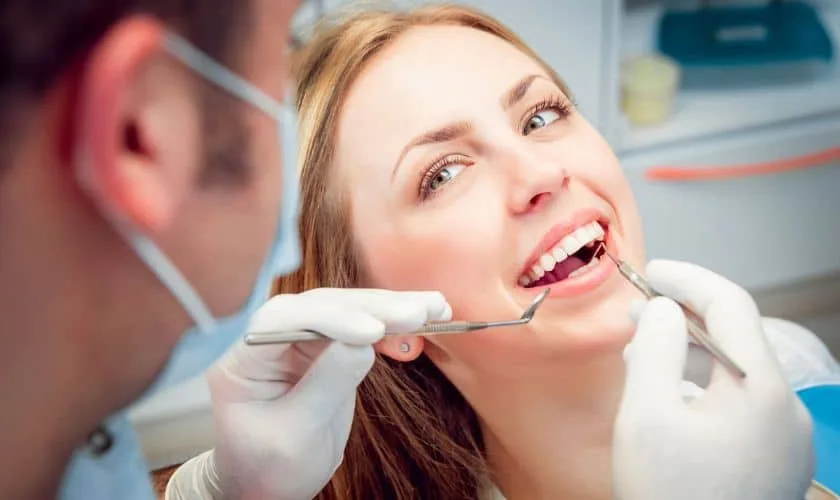Maintaining Dental Health: Simple Practices for a Healthy Smile

A healthy smile reflects not only dental health but overall wellness. Maintaining dental health is crucial, as oral health is closely linked to overall health. It encompasses a range of practices, from everyday hygiene habits to informed dietary choices and regular dental check-ups. This comprehensive guide aims to provide simple yet effective practices that ensure a lifetime of healthy smiles.
Key Takeaways
- Preventing common dental problems requires routine dental care.
- A healthy diet and good oral hygiene habits greatly influence dental health.
- Diverse lifestyle choices can positively or negatively impact oral health.
- Access to and affordability of dental care are greatly aided by dental insurance.
Importance of Regular Dental Checkups
Regular dental checkups are the cornerstone of maintaining optimal oral health. These consultations enable experts to identify potential issues before they become more serious, in addition to simply cleaning your teeth.
Treatments for conditions like cavities, gum disease, and oral cancer are easier to control and require fewer intrusive procedures when they are discovered early. Many dental issues remain undetected until they become uncomfortable or expensive to address, often due to a lack of regular checkups.
Dental insurance plays a crucial role in making these regular visits accessible and affordable. It often covers many preventive procedures, encouraging individuals to keep on track with their oral health care regimen without worrying about high costs. This coverage is crucial in areas where dental services might otherwise be financially unaffordable. To facilitate regular checkups, having access to dental insurance helps ensure that oral health does not take a back seat. Visit https://www1.deltadentalins.com/areas-we-serve/montana.html for an array of information regarding a dental plan that fits you.
Diet’s Influence on Dental Health
A key factor in maintaining dental health is a balanced diet. Sugary meals and beverages are the primary cause of cavities because they provide oral bacteria with the ideal diet to produce acids that erode tooth enamel. On the other hand, sticky foods that adhere to teeth can bring on longer-lasting acid attacks.
Conversely, foods rich in calcium and phosphorus, such as dairy products, help strengthen teeth and bones. Similarly, crunchy foods like apples and carrots stimulate salivation, helping to wash away harmful bacteria from dental surfaces.
A balanced diet that includes tooth-friendly foods and reduces sugar intake can enhance dental health. This approach preserves teeth’ structural integrity and fosters overall physical health, creating the foundation for long-term well-being.
Oral Hygiene Best Practices
Proper dental hygiene is the foundation of good dental health. Brushing with fluoride toothpaste at least twice daily and flossing daily are essential components of a healthy oral hygiene regimen, as they help eliminate plaque and debris from areas between teeth that a toothbrush may miss.
Changing your toothbrush or head regularly, approximately every three months or after being sick, is essential to ensure effective cleaning. Mouthwash is another tool in your dental hygiene arsenal that freshens breath, reduces oral bacteria, and adds another layer of protection against plaque.
These practices form the baseline of oral health. Incorporating them into daily life ensures your teeth and gums remain healthy and resilient against the rigors of time and dietary impacts.
Common Dental Issues and Their Prevention
Cavities and gum disease are among the most prevalent dental issues worldwide. Cavities result from tooth decay caused by acid-producing bacteria. Gum disease, starting with gingivitis, can progress to more severe periodontitis if left unaddressed, leading to tooth loss.
Prevention of these issues hinges on maintaining excellent oral hygiene, regular dental visits, and informed lifestyle choices. Fluoride treatments and sealants can offer additional protection against decay by strengthening enamel and providing physical barriers against bacterial invasion.
Understanding these common problems and taking proactive measures protects your teeth’s health and overall quality of life.
Lifestyle Choices That Impact Oral Health
Lifestyle choices have a significant impact on oral health, either positively or negatively. Smoking and excessive alcohol consumption can harm gums, stain teeth, and increase cancer risks. Both habits contribute to the development of gum disease and can exacerbate tooth decay.
Conversely, positive habits such as drinking plenty of water, eating a nutritious diet, and practicing stress management can bolster oral health by maintaining a more balanced environment in your mouth. Additionally, wearing protective gear during physical activities can prevent injuries to the mouth, while quitting smoking can lead to significant improvements in oral and overall health.
Understanding how everyday routines affect oral health enables you to make wise choices that support long-term wellbeing.
The Role of Dental Insurance
A comprehensive healthcare plan must include dental insurance. This coverage compensates for the expense of routine checkups and modest treatments, encouraging people to seek preventative care. It is essential for lowering the cost of dental treatment and making it more approachable and less intimidating.
Through insurance plans, more people can afford to engage in regular dental visits without the fear of massive bills. These visits are crucial for identifying issues early and preventing extensive and expensive treatments down the road. Having insurance enables people to prioritize dental health as part of their overall health plan.
Adopting dental insurance ensures that budgetary limitations do not hamper access to essential care and represents an investment in both present and future health.
Leveraging Technology for Better Dental Health
Maintaining a healthy mouth is now more straightforward thanks to improved dental care alternatives made possible by technological breakthroughs. In comparison, apps monitor oral health behaviors, remind you of routines and checkup dates, and electric toothbrushes with timers checkups complete cleaning.
Innovations such as dental health monitoring devices and smart flossers reveal areas that require improvement and enable real-time observation of one’s oral health status. By reducing the time between visits, these products improve the accessibility, effectiveness, and usefulness of dental care.
People can actively manage their dental health by integrating technology into their daily activities, creating a foundation for long-term well-being and a smile of confidence.
Understanding Genetics in Oral Health
Genetics can influence various aspects of dental health, from the color of your teeth to susceptibility to unavoidable conditions like cavities or gum disease. While you cannot change your genetic makeup, understanding these factors enables proactive dental care strategies.
If you’re genetically predisposed to softer enamel, using fluoride toothpaste and maintaining regular dental visits become even more critical. Similarly, understanding familial histories of gum disease can help you take preventive actions tailored to your genetic risk.
By acknowledging the role of genetics, you can work alongside dental professionals to develop personalized care plans that address inherent vulnerabilities, ensuring informed decisions for better health outcomes.
Tips for Maintaining a Healthy Smile
- Brush your teeth at least twice daily with fluoride toothpaste and floss daily to remove debris and plaque from hard-to-reach areas.
- Incorporate a daily mouthwash routine to reduce bacteria and freshen your breath.
- Limit sugary and acidic foods and drinks to protect tooth enamel.
- Stay hydrated to aid saliva production, which naturally cleanses the mouth.
- Visit your dentist regularly for professional cleanings and early detection of issues.
Embedding these practices into daily life helps safeguard the health of your smile, supports overall wellbeing, and fosters confidence in your oral health.
Conclusion
Caring for your dental health is a lifelong journey that involves checkups, dedication, and informed choices. By adhering to regular checkups, engaging in proper oral hygiene, making smart dietary and lifestyle decisions, and ensuring access to dental insurance, you lay the groundwork for a resilient and radiant smile. Embracing these practices enhances your oral health and positively impacts your overall well-being, enabling you to enjoy the benefits of a healthy smile for years to come.
Read More From https://businessallow.com/






